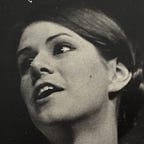When Children Feel Like Misfits, They Don’t Tell Us
I didn’t know calling my granddaughter ‘special’ was an insult
It’s the first day of school. A time of excitement for most kids. My youngest granddaughter had waited years for this day. It was a family ritual to walk with her brother and sister when school started each autumn. Disappointed countless times when she was too young to stay. Today was her day.
We flew to Texas for the occasion. Even at 6 years old, she understood our family revered education. Her father and mother both have graduate degrees in medicine. Her grandfather was an architect and engineer. Her great-grandfather, the first in his family of 11 children to attend university, earned a Bachelor of Science degree in engineering from Yale.
Crossing the threshold into lifelong learning
As proud grandparents, we walked her to school. She wore a new dress and shoes. We carried her soon-to-be-opened school supplies; pencils, crayons, glue, scissors, note paper, tissues, cleaning supplies for the school. She smiled the entire three-block walk. But she was usually quiet.
When she entered her first-grade classroom, her eyes widened. Colorfully decorated bulletin boards lined the room, jammed with 30 desks and dozens of kids she did not know. Laughter and chatter filled the air. Her older sister gave her an encouraging hug and was off to her second-grade class.
We took photos, as grandparents have a habit of doing. The teacher instructed the students to take their seats as she ushered us and other lingering family members out the door.
School’s out
Hours later, we stood outside the single-story, sprawling brick building as the bell rang, releasing kids from their first day of learning.
The double metal doors opened wide and a surge of youngsters emptied onto the front lawn, greeted by eager parents. We were off to the side under the shade of a massive oak tree.
We waved and shouted her name. When our granddaughter spotted us, she came running, her hands clutching several drawings and alphabet practice sheets. Kneeling down with open arms, I fell backwards from the force of her embrace.
“How was it? Was school fun?” I laughed, sitting on the ground and hugging her.
“It was great!” she exclaimed. “I could do everything.”
In that very moment, when she said “I could do everything,” I understood the weight she’d carried for most of her young life. She didn’t believe she was smart. She felt inferior to her siblings. Before they entered school, her sister, a year older, and brother, eight years older, became accomplished readers. Smart. Voracious learners. She felt her skills didn’t match.
Making the grade
She was younger and slightly dyslexic. I can only imagine the extent of bravery she mustered to walk into school, feeling she was different. Knowing she could not compete with her older brother and sister. She expected the same failure when compared with schoolmates.
Yet she never said a word.
And she had no idea her initial reaction, “I could do everything,” belied her internal struggle, thinking she could do nothing.
“Do you know how special you are? How excited and proud we are?” I gushed.
Her smile quickly faded. “Is that special? Or is that ‘special, special’,” she retorted with an unusual edge in her voice.
Even as a first-grader on her first day of school, one of the first lessons she would learn: “special” was code for “special classes” for “special students” who needed “special” help. Kids who were not ‘smart.’ School would label them as “special” and take them out of class for “special” lessons. Being “special,” in her eyes, was code for you do not fit in.
I had used the word not knowing at a young age being called “special” could be considered an insult.
The arc of the universe
The universe is coming full circle, however. That same little 6-year-old, now a young adult, recently returned to university, having already earned a degree in the alternative energy industry.
This spring, she’ll graduate with a degree in elementary education. She will walk back into the classroom, this time as a teacher who most likely remembers feeling as if a misfit and being labeled “special.”
I don’t know how much she remembers from her first day of school. I am certain there are unspoken, maybe even unknown, traces of that child who worried about not fitting in.
And I plan on traveling to Missouri to be there again, to give hugs when she walks back into elementary school. This time, she’ll be head of the class.
